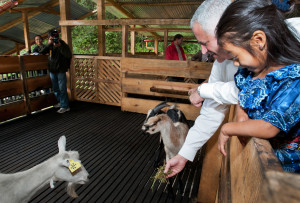A Westport nonprofit has teamed with one of the country”™s largest coffee companies to open a goat-raising center in Guatemala that is aimed at stemming childhood malnutrition and providing the community with sustainable income.
Save the Children, which has worked in Guatemala since 2000, Green Mountain Coffee Roasters Inc. and the U.S. Agency for International Development (USAID) marked the opening of the center July 11 in Aldea El Paraiso, a small village in the Quiché highlands region.
In the region, 72 percent of children under age 5 suffer from chronic malnutrition, according to Save the Children. With more than 100 goats and a capacity for 300, the center is expected to support dozens of surrounding communities.

“We hope that over 3,000 families benefit during the life of this project, benefit from this initiative,” said Carlos Carrazana, COO of Save the Children. “That includes both the malnutrition side, so the children have access to goat milk, cheese and meat, as well as the livelihoods component, which is helping these families create a business for themselves.”
The latter component ”” supporting peoples”™ livelihoods ”” is critical to Save the Children”™s work, Carrazana said. “It”™s not only how do we help increase the quality of life but also … how do we elevate the financial conditions of communities?”
Carrazana said private-sector partners like Green Mountain play an integral role in the development of “sustainable interventions,” or projects that will live on even after Save the Children and its partners”™ involvement ends.
“We are hoping that at the end this is no longer a project, it”™s something that”™s integrated into the community,” Carrazana said. He said funding for the project will last for about three years.
Green Mountain first partnered with Save the Children in 2009 to improve food security for coffee-producing families in Nicaragua, and the company has since contributed more than $7 million to various projects in Latin America and Indonesia.
“They have a vested interest in the communities they get their coffee from,” Carrazana said. “At Save the Children we like to bring in the corporate partners because they play such a different role than traditional funding from the U.S. government. … I think the corporate partners bring a different perspective to these public-private projects.”
Rick Peyser of Green Mountain said the company looks to make long-term investments in its supply-chain communities.
“We are interested in a long-term supply of high-quality beans. If farmers can”™t feed their families, they are not going to feed their coffee plants,” said Peyser, the company”™s director of social advocacy and supply chain community outreach, in an email from Nicaragua. “We are working with Save the Children in Guatemala because that region has one of the highest rates of child malnutrition in all of Central America.”
Peyser said Green Mountain in the past has partnered with numerous nonprofits and other non-governmental organizations, which he said provide “the boots on the ground.”
“We need to have healthy people in our supply chain that have the intellect and capacity to invest in their coffee. So we are investing in the very foundation of our supply chain, to make sure it is strong in the future,” he said. “This has been our approach to supporting supply chain communities since 1988, so yes, we know it is effective and replicable.”



















